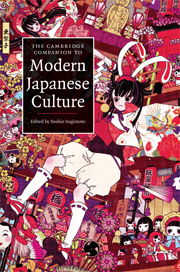Book contents
- Frontmatter
- ‘Japanese culture’: An overview
- 1 Concepts of Japan, Japanese culture and the Japanese
- 2 Japan’s emic conceptions
- 3 Language
- 4 Family culture
- 5 School culture
- 6 Work culture
- 7 Technological culture
- 8 Religious culture
- 9 Political culture
- 10 Buraku culture
- 11 Literary culture
- 12 Popular leisure
- 13 Manga, anime and visual art culture
- 14 Music culture
- 15 Housing culture
- 16 Food culture
- 17 Sports culture
- 18 Globalisation and cultural nationalism
- 19 Exporting Japan’s culture: From management style to manga
- Consolidated list of references
- Index
14 - Music culture
Published online by Cambridge University Press: 28 January 2010
- Frontmatter
- ‘Japanese culture’: An overview
- 1 Concepts of Japan, Japanese culture and the Japanese
- 2 Japan’s emic conceptions
- 3 Language
- 4 Family culture
- 5 School culture
- 6 Work culture
- 7 Technological culture
- 8 Religious culture
- 9 Political culture
- 10 Buraku culture
- 11 Literary culture
- 12 Popular leisure
- 13 Manga, anime and visual art culture
- 14 Music culture
- 15 Housing culture
- 16 Food culture
- 17 Sports culture
- 18 Globalisation and cultural nationalism
- 19 Exporting Japan’s culture: From management style to manga
- Consolidated list of references
- Index
Summary
The expressions hōgaku and yōgaku are among the terms regularly used when people discuss music in present-day Japan. These words stem from the idea that music (-gaku) as a whole is divisible into that of Japan (hō) and that of the West (yō). While hōgaku stands for 'Japanese music', and yōgaku for 'Western music', the actual concepts are a little more complex than this simple division suggests. Let us thus attempt to compare the hōgaku and yōgaku distinction based on a native Japanese perspective, with the three domains of 'art music', 'folk music' and 'popular music'. These domains, frequently employed in the classification of music, constitute so-called 'ideal types' and do not necessarily illustrate the substance of the music. 'Art music' signifies music which has as its audience the upper echelons of society and the elite; its composers can be identified; it is written down in advance in musical notation; it is accepted over a long period of time; and it aspires to artistic values. 'Folk music' has the members of a regional community as its audience; its composers are unidentifiable; it circulates by oral transmission; it is accepted over a long period of time; and it aspires to a unification of sentiment among the community. 'Popular music', assumes a large-scale audience; its composers can be specified; it circulates through a medium which records its sounds; its period of acceptance is relatively short; and it aspires to financial gain.
- Type
- Chapter
- Information
- The Cambridge Companion to Modern Japanese Culture , pp. 261 - 280Publisher: Cambridge University PressPrint publication year: 2009



